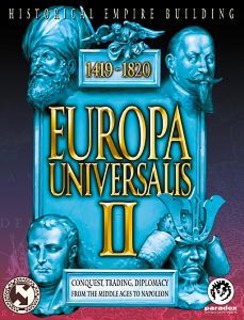Europa Universalis was a superb game and the sequel gives us all the greatness of the first part and much more.
Europa Universalis II is a significant step forward in comparison to its predecessor. EU II does what Europa Universalis did but much better. This time we get from the Paradox Interactive game that develops things that have been omitted or not enough represented in the original EU. We get to become a ruler of nearly any country that existed between 1419 and 1795. The timeline is divided into several campaigns like the Grand Campaign which dates from mentioned 1419 up to the 1820 through Napoleon Ambitions, Fantasia, Age of Enlightenment, Exploration, Mercantilism, Revolution and American Dream.
Game is really quite similar to EU. The first difference is the variety of countries. We no longer are limited to few ones prepared by the developer and don’t have to meddle in files to unlock other nations. The very instant we click on one of the coat of arms with right mouse button we get a long list of available countries all over the world from Incas and Cherokee through Mali, European countries, Brunei, Gujarat, Manchu and so on and so on. Pretty much all countries from selectable eras are covered thoroughly and that is impressive. After making the difficult choice it is time to start new game. At the first sight not many changes here. Time runs continuously and just like in the previous Europa we can pause it, speed it up or slow it down. First change is the map. Now it is way bigger and feature much more provinces. Graphic engine stayed the same, so no revolution here. So what is new? Few things. Finally we get to manage our internal policy and the direction our country will go. Left clicking on coat of arms opens access to new options. Here we can every ten years adjust one of several sliders a step into chosen direction. We can go with centralization that will decrease time to develop new technologies but will affect the time we will be regaining stability. Furthermore we can go either towards mercantylism or free trade and in few more directions. Proper management of those sliders can give us serious advantage or sentence for year of fighting revolts.
Provinces gained the culture that is now a very important factor. It will be much harder for smaller countries to conquer the world just because cultural differences between country and provinces will result in revolts. This way game becomes more historically accurate, it is hard to imagine that some far Asian provinces don’t suffer severe penalty in stability while under European control and also the other way too. As far as graphics is concerned, EU II offers a small improvement, it is not a leap forward, but a small step. For the hardcore strategy fans graphics is a secondary issue and it is hard to want more from game this type. Well, something had to be changed and we finally can set the in-game resolution which is helpful when it comes to macro management.
Sound doesn’t annoy, the vast variety of music divided between the ages just blend in with the game itself and gives you the nice feeling that something accompanies you in the background during your world conquest. Since we face only the game map, sounds are limited to noise made by clicking, selecting armies and moving them, which is enough.
Game is more complex than its predecessor, which makes it less accessible for newcomers. The verdict is, if you are a strategy connoisseur, you will fall in love with Europa Universalis II, if you are new to this game, read paradox forum.

